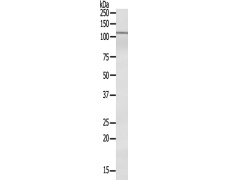中文名稱:兔抗ARHGAP11A多克隆抗體
|
Background: |
GTPase-activating proteins (GAPs) accelerate the intrinsic rate of GTP hydrolysis of Ras-related proteins, resulting in downregulation of their active form. ARHGAP11A (Rho GTPase activating protein 11A), also known as KIAA0013 or MGC70740, is a 1,023 amino acid protein that contains one helical Rho-GAP domain and is encoded by a gene located on human chromosome 15. Defects in the gene encoding ARHGAP11A may cause mental retardation. Human chromosome 15 encodes over 700 genes and comprises nearly 3% of the human genome. Angelman and Prader-Willi syndromes are associated with loss of function or deletion of genes in the 15q11-q13 region. In the case of Angelman syndrome, this loss is due to inactivity of the maternal 15q11-q13 encoded UBE3A gene in the brain by either chromosomal deletion or mutation. In cases of Prader-Willi syndrome, there is a partial or complete deletion of this region from the paternal copy of chromosome 15. Tay-Sachs disease is a lethal disorder associated with mutations of the HEXA gene, which is encoded by chromosome 15. Marfan syndrome is associated with chromosome 15 through the FBN1 gene. |
|
Applications: |
WB |
|
Name of antibody: |
ARHGAP11A |
|
Immunogen: |
Synthesized peptide derived from internal of human RHG11A. |
|
Full name: |
Rho GTPase activating protein 11A |
|
Synonyms: |
GAP (1-12) |
|
SwissProt: |
Q6P4F7 |
|
WB Predicted band size: |
114 kDa |
|
WB Positive control: |
NIH/3T3 cells lysate |
|
WB Recommended dilution: |
500-3000 |

 購(gòu)物車
購(gòu)物車 幫助
幫助
 021-54845833/15800441009
021-54845833/15800441009
